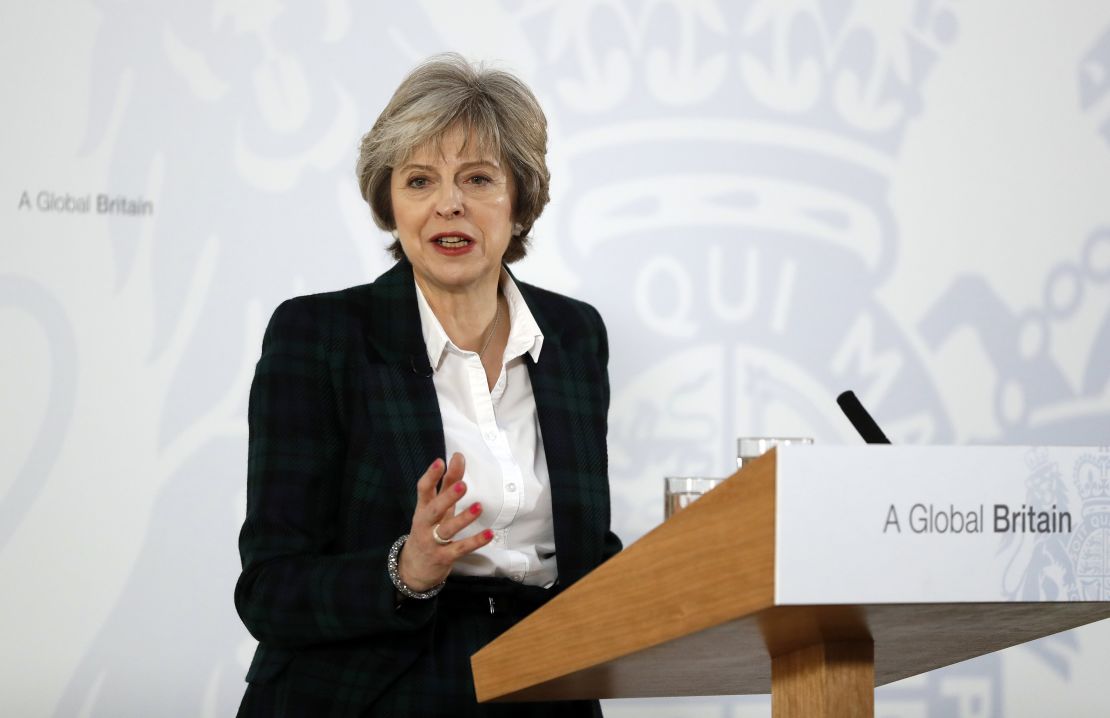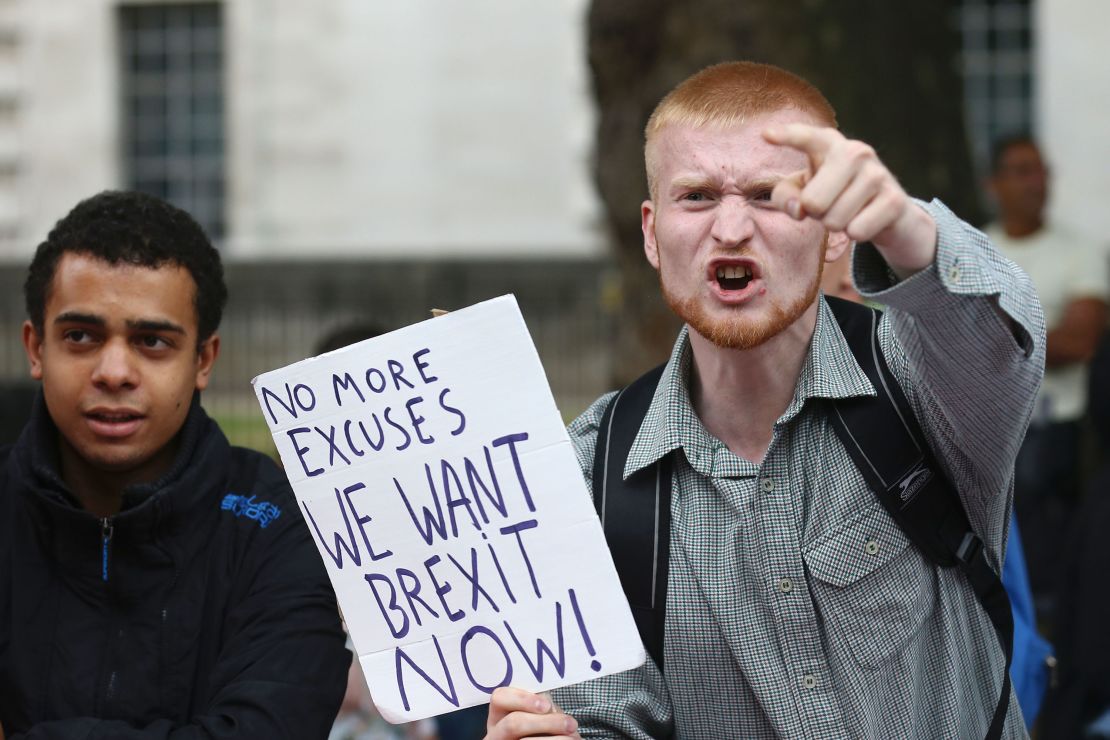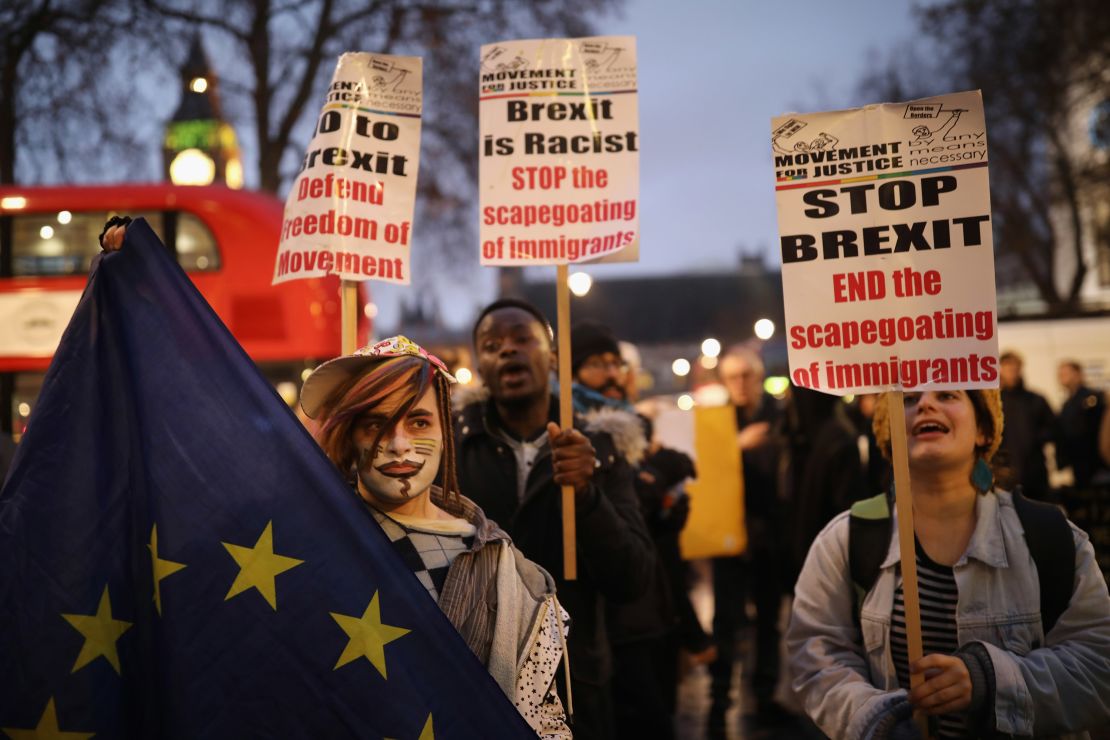Story highlights
Theresa May announces she will put final Brexit deal to a vote in UK Parliament
Reversing Brexit would be difficult but not impossible, expert says
British Prime Minister Theresa May has set out her vision for Britain outside the European Union, making it clear she will pursue what critics have called a “hard Brexit.”
In a highly anticipated speech Tuesday in London, the Conservative leader pledged that Parliament would get a vote on the Brexit deal Britain reaches with the EU.
“The United Kingdom is leaving the European Union,” May said. “My job is to get the right deal for Britain as we do.”
Many are now asking if Brexit can be undone.
What’s the short answer? It would be very difficult.
What is the vote?
In her speech, May promised that both the House of Commons and House of Lords would be given the opportunity to vote on the final Brexit deal. But talks around a deal can’t begin until the British government invokes Article 50 of the Lisbon Treaty, formally notifying the EU of its intention to withdraw from the union. So the vote will take place after Brexit is already well underway.
May has said she will trigger Article 50 by the end of March. The UK Supreme Court is due to rule in the next few weeks on whether there must be a vote in Parliament before that can happen.

The likelihood of Parliament challenging Article 50 is low, said Quentin Peel, an associate fellow with the Europe program at Chatham House, a London-based think tank.
“What Theresa May was trying to do today was ensure that she keeps a majority to go ahead with Article 50,” Peel told CNN. “The only thing that would stop this happening is a split in the Conservative Party and that, at this moment, doesn’t look very likely.”
What happens if Parliament passes the deal?
Negotiations on the final Brexit deal are expected to take at least two years before being put to Parliament for a vote.
The terms of the deal are as yet unknown; however, May laid out some of the key parameters Tuesday for her plan to extract Britain from the EU. Among them, May confirmed that Britain would leave the EU single market, which ensures the free movement of goods, services and people within the bloc. She revealed that Britain would seek an arrangement to replace the provisions of the EU customs union.

May also indicated that her aim was to regain full control of immigration and lawmaking.
But beyond that, the Prime Minister did not offer much more in the way of clarity.
While May underlined that she wanted to guarantee the rights of EU citizens already in Britain and British citizens in other EU states, she made it clear that they were up for negotiation.
Beyond immigration, there is also a question mark over what will happen to Britain’s open border with Ireland as well as the “precious union” of the United Kingdom’s constituent parts – Scotland, Wales and Northern Ireland.
What happens if it doesn’t?
When asked what would happen if Parliament voted against the deal, May said, “I am sure the British Parliament will want to deliver the views of the British people and respect the democratic decision that was taken.”
But what does “no deal for Britain” actually look like? At the moment, it isn’t clear, and a lot could change in two years.
“Because Theresa May has now conceded that she will at least put it to a vote in Parliament, there must be an outside chance that it would be reversible,” Peel said.

“Say she comes back in two years with a deal and Parliament decided that it was a lousy deal,” Peel said. “What would the consequences be for voting it down? Would voting no to the outcome mean we go back to square one, or would it actually result in Britain falling out of the European Union with no agreement at all … in a complete chaotic mess?”
Article 50 states that the leaving country ceases to be a member of the EU two years after triggering the process unless the European Council unanimously agrees an extension of negotiation. So if Parliament voted down a deal, then Britain would exit without any kind of deal at all once two years had elapsed
A new anti-Brexit court case, to be launched in Dublin by the end of January, will look at whether Article 50 can be reversed after it has been triggered. The verdict may give us a better understanding of what might happen if Parliament votes against a Brexit deal.
What else could derail Brexit?
There are a number of things up in the air that could slow down the Brexit deal – namely Scotland and Northern Ireland. Although the majority of British citizens opted to leave the EU in last year’s referendum, a majority of Scotland and Northern Ireland voted to stay.
Experts say they are unlikely to derail a deal, but if the devolved parliaments in Scotland, Northern Ireland and Wales are entitled to vote on triggering Article 50, it could delay Brexit further.
Scottish First Minister Nicola Sturgeon issued a swift and strong response to May’s speech on Tuesday, saying that leaving the single market would be “economically catastrophic.” The Scottish government has previously raised the prospect of a second independence referendum if Scotland’s membership of the single market was threatened.
But Scotland is not the only concern.
Peel said that elections across Europe this year could make negotiating a deal slow-going.
“We have Dutch elections, French elections, possibly Italian elections and German elections. All of those countries are going to be looking inward for the rest of this year. We aren’t going to have a new German government until December,” Peel said.
“You can’t have really serious negotiations until 2018. Instead of having two years for negotiations, we’re actually going to have one year, followed by a very rapid period of parliamentary scrutiny and a vote. Whether they can do it in the two years is highly doubtful.”
CNN’s James Masters contributed to this report.

